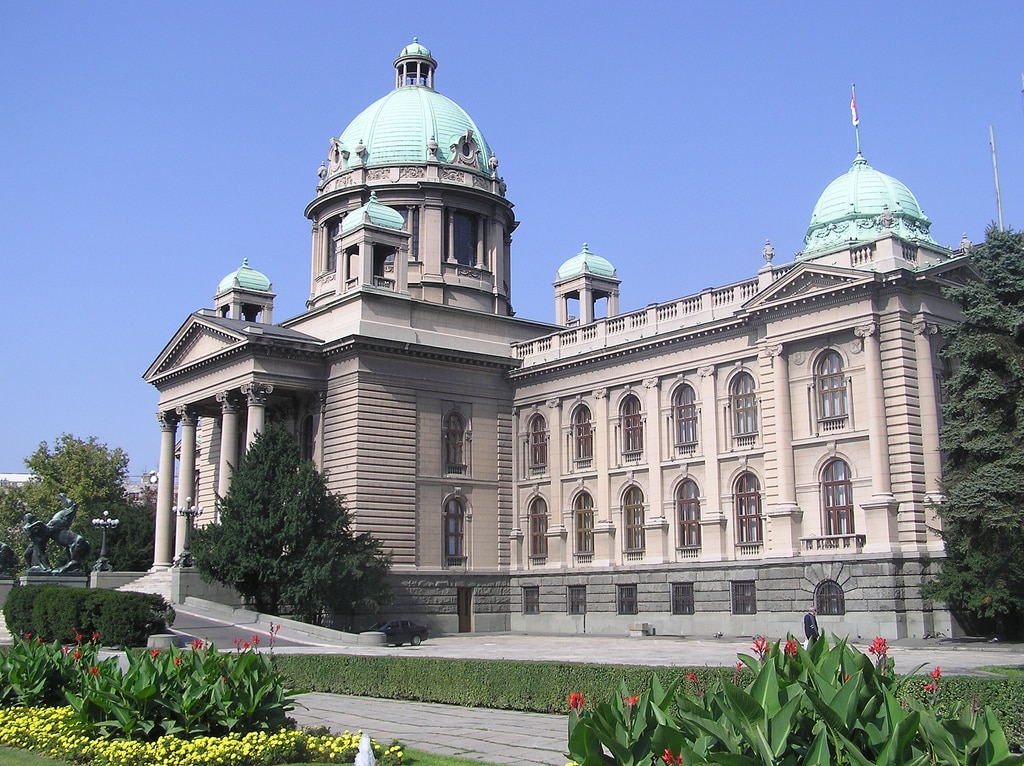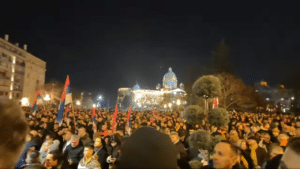According to preliminary results President Aleksandar Vučić’s ruling Serbian Progressive Party (SNS) won the municipal elections in Serbia’s capital Belgrade by obtaining 45% of the votes. Former mayor Dragan Đilas – backed by the Movement of Free Citizens (PSG) – and the movement of Aleksandar Šapić, received respectively 19% and 9% . The SNS coalition partner, the Socialist Party (SPS), won 6%. The Democratic Party (DS) – that formed the core of the opposition movement that toppled down Milošević regime – received 2,3% and, with that, did not pass the 5% threshold.
Important elections The Belgrade Assembly election is considered by many observers as being more than just a mundane municipal election. With more than 20% of the population living in the Serbian Capital and 40% of the GDP being produced in the city, Belgrade is considered to be the central hub of the country. The mayoral office is therefore often called the third most powerful position in the country, after the president and prime minister. The mayor of Belgrade is chosen by the City Assembly and therefore the body is a crucial part of Serbian politics.
Until 2014, the Democratic Party dominated the Assembly. The social democratic led central-left coalition broke apart after popular support for the coalition crumbled. The center-right Serbian Progressive Party won the snap Assembly election in 2014 by a landslide. Since then the SNS controls the Assembly, Parliament and the Presidency. This tight grip on the most important political institutions of the country has alarmed observers.
The control of the party over the country has therefore become an important issue. The 2018 election has by many opposition leaders been called a test for the opposition to break the growing grip of the SNS. Nonetheless did the SNS win a majority. What happened to the opposition?
Scattered opposition One of the most important factors that undermined the opposition were the political problems on the left. Since the Democratic Party was ousted in 2014 in both parliamentary and Belgrade elections, a real unified opposition force has been missing in Serbia. It was in these circumstances that the SNS was able to win elections and accumulate power. Nevertheless did the Democratic Party hold enough seats in most levels of government to influence political decision making. Popular supported crumbled however even further. Internal reforms could stop the eroding of the party.
In 2017 the party joined forces with the new Movement of Free Citizens (PSG) of Saša Janković for his bid for the presidency. The PSG essentially was a coalition of social democrats, social liberals and pro-Europeanist. Although Janković lost to current SNS President Aleksandar Vučić, the movement seemed to be a promising initiative. Talks went on to unite the efforts of the PSG and DS for the upcoming Assembly elections. A potential alliance between the Democratic Party and the Movement of Free Citizens broke apart when the parties couldn’t reach an agreement. In rare cases the DS was willing to cooperate with the SNS on certain laws and issues in the parliament, while the PSG wants to exclude the SNS on all issues.
The breaking of the alliance proved to be crucial leading up to the election. With center-left being scattered among two parties, the changes of the opposition seem to dwindle. Former DS chairman and mayor of Belgrade, Dragan Đilas, joined the PSG. Signaling the further disunity among the left. Aleksandar Šapić, the Mayor of New Belgrade, launched his own initiative. As a former DS member he was dissatisfied with party politics. Hoping that a personal bid would break the deadlock. With the Democratic Party members divided among three parties, the weakness of the opposition in month leading up to the election was fully exposed.
Media coverage & developing democracy The Center for Research, Transparency and Accountability reported that with the media attention, the number of politicians involved in the campaign and the campaign funds itself, the election had the spirt of a national election. Even with all this media attention, the opposition was marginalized by the press. The SNS received reportedly 70% of the media attention in newspapers and on television, while the opposition sometimes didn’t even get time on air.
With the SNS controlling almost all public broadcasting in Serbia, they could create a narrative surrounding the opposition. The focus was often put on smaller parties. The first televised debate was for example between six minor parties who didn’t have a chance at winning seats. By putting more emphasis on the ‘’passionate opposition’’ instead of the real opposition, the SNS received way more attention. If compared to the previous election cycle, the imbalance between the media attention that the opposition and ruling parties got, doubled.
Besides the scattered opposition and the media attention there are still problems with the Serbian democracy itself. The voter turnout has been for the past twenty years around 50%, also in this election. Recent research showed that around 14% of the Belgrade eligible voters didn’t come to the polls because they didn’t know what to vote for. This has resulted in the difficult mobilization of opposition forces. Furthermore there is a strong political culture that favors personal charisma and winning above ideology.
The opposition now has to lick its wounds. The SNS seemed to tightened its grip on the country. With new opposition parties in the Assembly and old ones gone, Serbia enters a new political chapter.
Sources: Balkan Insight N1 TV New York Times



